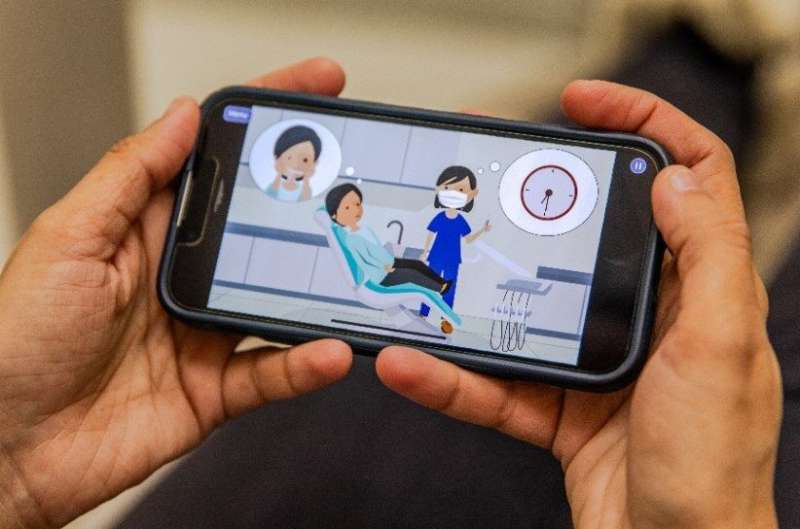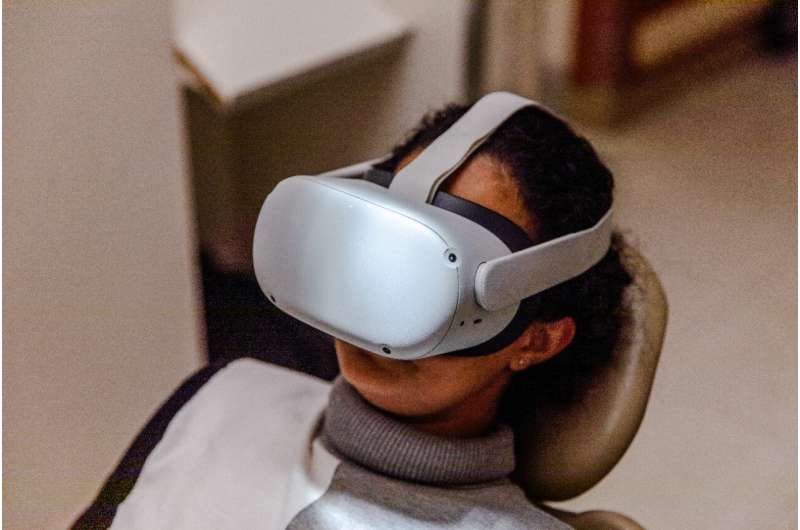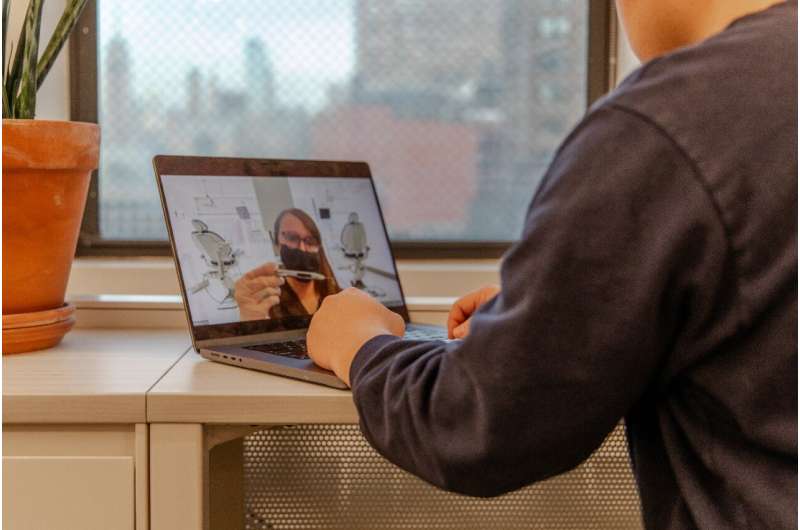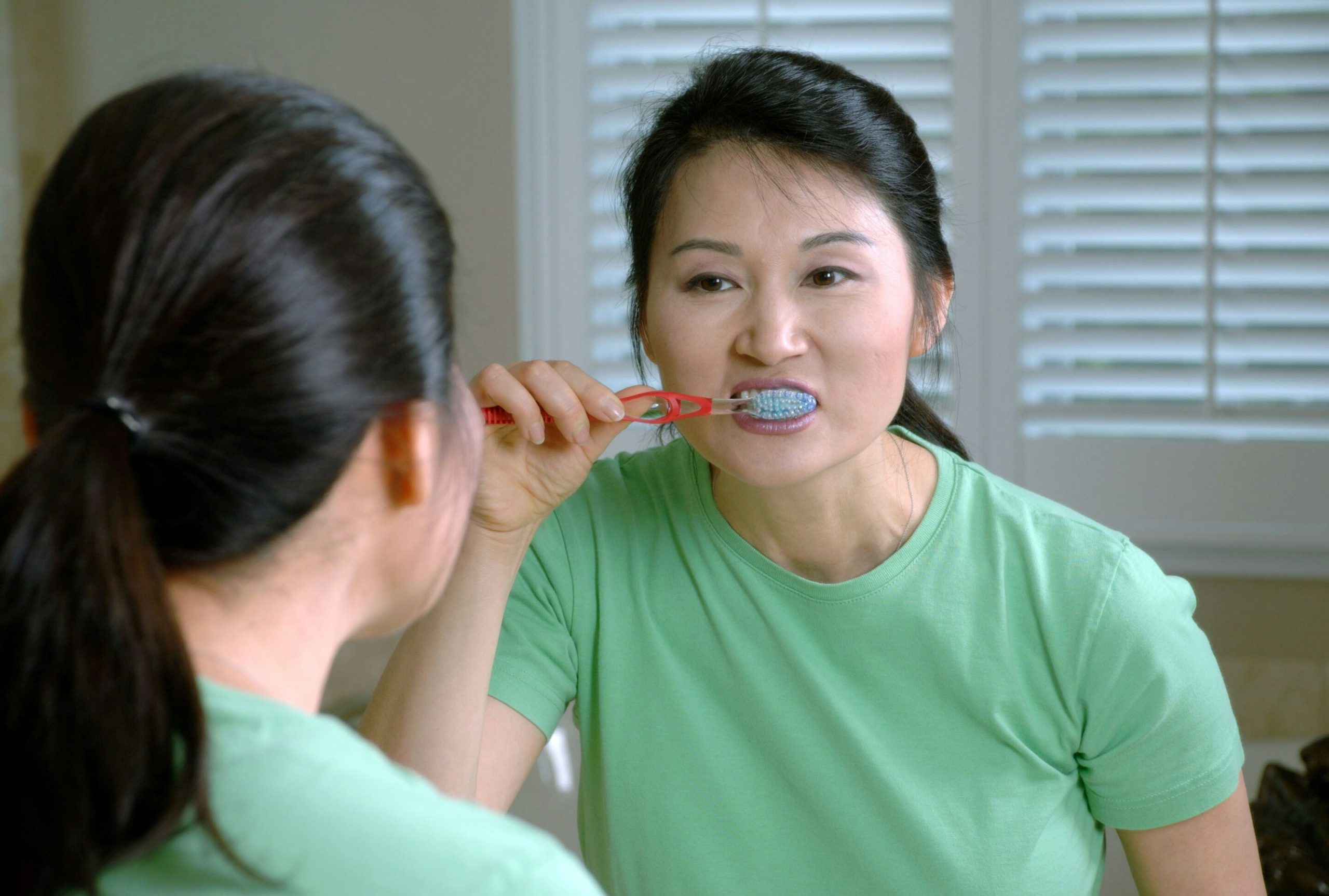
Does the idea of sitting in a dental chair make your palms sweat? Or do you simply avoid making appointments altogether? You’re not alone. Research shows that 30% of people fear going to the dentist, including more than 20% who have had an appointment recently, according to an NYU study.
But a new app created by researchers at NYU College of Dentistry and Penn School of Dental Medicine shows promise in treating this distress, using the principles of cognitive behavioral therapy and mindfulness—all from the comfort and privacy of home. In the pilot study, half of participants reported that they were no longer fearful. The use of virtual reality is also being studied as a way to further immerse patients in simulated appointments.
The research are published in the Journal of Public Health Dentistry.
“These technologies empower patients via strategies to manage their thoughts, feelings, and behavior at their next dental appointment,” says Richard Heyman, a clinical psychologist, co-director of the NYU Dentistry Family Translational Research Group, and a principal investigator of the dental fear research.

The consequences of avoiding the dentist
People who fear going to the dentist often skip their regular cleanings, which can worsen their oral health. As a result, they are more likely to only see a dentist when something goes wrong.
And that creates “more instances of pain, infection, and broken teeth, which means the need for more dental work, which all results in more fear,” says Mark Wolff, dean of the University of Pennsylvania School of Dental Medicine and a principal investigator of the dental fear research. “Learning to manage one’s fear of dental care and the dentist is the only answer to improving oral health.”
“Skipping regular visits is not only harmful for oral health, but this avoidance makes the fear worse,” adds Amy Slep, a clinical psychologist, co-director of the NYU Dentistry Family Translational Research Group, and a principal investigator of the dental fear research. “It doesn’t give patients the opportunity to approach what they fear and disprove their negative ideas about dental care.”
Dental fear is highly treatable—but rarely treated
Many studies show that cognitive-behavioral therapy (CBT) can be effective in treating fear of dental care. With this mode of care, patients learn from a health professional about the nature of anxiety and dental procedures; practice ways to manage their thoughts, feelings, and behaviors at the dentist; and test whether the things they fear will happen actually do. Over several hours in a dental office, patients learn to face their fears, identify and challenge their negative beliefs, and test their capacity to cope better at the dentist.
Yet very few dental clinics offer CBT for dental fear, and NYU research shows that some dentists are hesitant to incorporate this treatment into their practice due to financial or logistical barriers. Instead, people with dental fear are commonly offered anti-anxiety medication or sedation—treatments that are “compassionate but counterproductive,” says Heyman.
“Receiving sedation or anti-anxiety medication can signal to a fearful patient that they can’t handle seeing the dentist without this help, which perpetuates the cycle of fear, avoiding the dentist, and then having more serious problems to address,” he adds.
Moreover, dentists may not even realize that their patients are scared.
“With dental fear, there is often an enormous gap between patients and dentists,” says Kelly Daly, a researcher scientist at NYU Dentistry’s Family Translational Research Group and project director for the dental fear research. “Fear can present as aggression, rudeness, no-shows, or cancellations, so it’s in dentists’ best interest to help patients overcome their fear.”

Facing fear (from home)
The challenge confronting the research team was not how to treat dental fear, but how to package the proven approaches in a way that is both accessible to patients and works for dentists.
They developed a smartphone app, Dental FearLess, which uses the “active ingredients” of CBT in an engaging series of activities, all done virtually. In the app, participants are led through educational materials on fear and anxiety, including strategies and coping skills to use at the dentist, from breathwork and muscle relaxation to effective communication and challenging unhelpful thoughts. Participants also watch videos showing interactions between dentists and patients and then practice the strategies they’ve learned. Finally, they create an action plan for managing fear at their next appointment.
“The program aims to change what you do, what you think, and what you feel at the dentist,” says Jasara Hogan, a research scientist at NYU Dentistry’s Family Translational Research Group and a dental fear researcher.
Participants who are still experiencing dental fear after using the app then take part in a one-on-one Zoom session with a mental health provider that is tailored to their specific concerns. The hour-long session includes a simulated visit to the dentist—complete with drill sounds and a provider wearing scrubs—as an opportunity to test out new skills.
In a pilot study of Dental Fearless, 48 participants with moderate to severe dental fear used the app, and a subset also completed a one-on-one session. The study showed promising results: After their next visit to the dentist, half (49%) of participants were no longer fearful, nearly all (97%) said that they were able to effectively handle the discomfort of going to the dentist, most (85%) reported that the appointment had gone better than expected, and more than half (60%) said that the fear they experienced was less intense than anticipated.
The researchers are continuing to study Dental FearLess in a larger, national study. They are also testing the use of virtual reality as an add-on to treat dental fear, with the goal of developing a set of research-based tools that private dental practices can adopt to treat fear among their patients.
More information:
Richard E. Heyman et al, Leveraging technology to increase the disseminability of evidence‐based treatment of dental fear: An uncontrolled pilot study, Journal of Public Health Dentistry (2023). DOI: 10.1111/jphd.12598
Citation:
Overcoming dental fear with the tap of an app (2024, February 26)
retrieved 21 September 2024
from https://medicalxpress.com/news/2024-02-dental-app.html
This document is subject to copyright. Apart from any fair dealing for the purpose of private study or research, no
part may be reproduced without the written permission. The content is provided for information purposes only.



